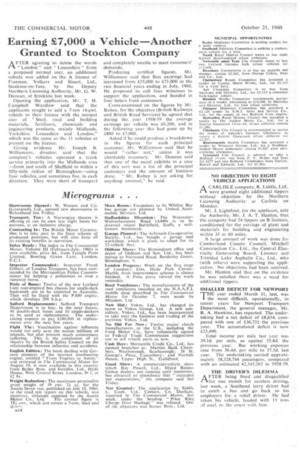Earning £7,000 a Vehicle Another Granted to Stockton Company.
Page 52

If you've noticed an error in this article please click here to report it so we can fix it.
AFIER agreeing to delete the words "London" and " Lancashire " from a proposed normal user, an additional vehicle was added on the A licence of Freeman, Volkers and Stuart, Ltd., Stockton-on-Tees, by the Deputy Northern Licensing Authority, Mr. G. W.
Duncan, at Stockton last week. •
Opening the application, Mr. T. H. Campbell Wardlaw said that the applicants sought to add a 7-ton 14-gwt. vehicle to their licence with the normal user of " Steel, road and building materials, fertilizers, chemicals and engineering products, mainly Midlands, Yorkshire, Lancashire and London,". which was the same as the 11 vehicles at present on the licence.
Giving evidence Mr. Joseph B. Williamson, director, said that the company's vehicles operated a trunk service primarily into the Midlands area —from just south of Sheffield to within a fifty-mile radius of Birmingham—using four vehicles, and sometimes five, in. each direction. They were short of transport and completely unable to meet customers' demands.
Producing certified figures, Mr. Williamson said that fleet earnings had increased from £55,000 to £71,000 in the two financial years ending in July, 1960. He proposed to call four witnesses to support the application, and handed in four letters from customers.
Cross-examined on the figures by Mr. Robey, for the objectors (British Railways and British Road Services) he agreed that during the year 1958-59 the average earnings per vehicle was £6,200, and in the following year this had gone up by £800 to £7,000.
Asked if he could produce a breakdown in the figures for each principal customer, Mr. Williamson said that he would " rather not," unless it was absolutely necessary. Mr. Duncan said that one of the usual exhibits in a case of this sort was a list of the principal customers and the amount of business done. "Mr. Robey is not asking for anything unusual," he said.




















































































































